雅思口语试讲
雅思口语part one 讲义

• 这部分很多同学都会出现听不懂问题的情况,因为单词难度增加了,这时 候不要慌,你可以让考官给你解释,也可以让考官重复一遍问题,实在不 行了,就让考官问下一个问题。
• 这部分要表现得好点,没有一定的语言底子是不可能的,六分以下的同学 应多积累相关话题词汇。
3. 语法:
7分:考生能熟练使用各种常见语法结构,而且基本准确,在使用 复杂的语法结构时偶有错误。
6分:考生基本语法能较为熟练准确适用,偶有错误,但不影响交 流;能使用一些较为复杂的语法结构,如定语从句,但不是很 准确。
5分:考生即使在简单语法结构,如时态,人称单词,单复数等上 面也经常出错,有时甚至严重影响理解;基本不能使用复杂 语法结构。
2. Eating at home is also a lot more economical. With just 20 RMB, you can cook a decent meal at home, but i20 RMB is just enough to buy you only one dish in a restaurant.
original
necessities competitive bathing suit eຫໍສະໝຸດ uallyquarterly
journalist
employees Enormous electronic
(三)关于评分标准语音方面的调整。
雅思口语考试在2008年以前,在发音评分上只有2,4,6, 四个等级,现在改为1-9,九个等级,也就是发音方面评分进一步 细化,这对有发音优势的考生绝对是好消息。
2024年雅思口语课件完整课件

雅思口语课件完整课件雅思口语课件一、引言雅思口语考试是雅思四项考试之一,主要评估考生在英语口语表达方面的能力。
本课件旨在帮助考生提高雅思口语考试的技巧,使其能够在考试中发挥出最佳水平。
通过本课件的学习,考生将掌握雅思口语考试的结构、评分标准、常见话题和答题技巧。
二、雅思口语考试结构雅思口语考试分为三个部分,共计11-14分钟。
1.第一部分:自我介绍和日常话题(4-5分钟)考生需要回答一些关于个人信息、兴趣爱好、家庭、工作或学习等方面的问题。
这部分的问题相对简单,主要目的是让考生适应考试环境,放松心情。
2.第二部分:个人陈述(3-4分钟)考生需要根据一张卡片上的话题进行个人陈述。
在这部分,考生有1分钟的时间准备,可以做一些笔记。
陈述时间约为2分钟,之后考官会就陈述内容提出一两个问题。
3.第三部分:深入讨论(4-5分钟)考官会就第二部分的话题进行更深入的讨论,提问一些与话题相关的问题。
这部分的问题较为抽象,需要考生具备一定的思维能力和语言组织能力。
三、雅思口语评分标准1.流利性与连贯性:考生能否顺畅地表达自己的观点,是否能够使用恰当的连接词使句子连贯。
2.词汇资源:考生能否使用丰富的词汇表达自己的观点,是否能够使用一些不常见的词汇。
3.语法范围与准确性:考生能否使用多种语法结构,是否能够正确地使用语法。
4.发音:考生的发音是否清晰,是否能够使用自然的语调。
四、雅思口语常见话题1.个人信息:姓名、年龄、家乡、工作或学习等。
2.兴趣爱好:运动、音乐、电影、旅行等。
3.家庭与朋友:家庭成员、朋友关系、节假日活动等。
4.工作与学习:工作职责、学习经历、学校设施等。
5.日常生活:生活习惯、交通方式、购物等。
6.旅游:旅行经历、理想中的旅行目的地、旅行中的困难等。
7.未来规划:职业规划、留学计划等。
五、雅思口语答题技巧1.第一部分:简短回答,保持流利。
尽量避免长时间的停顿和重复。
2.第二部分:条理清晰,观点明确。
环球雅思口语试讲
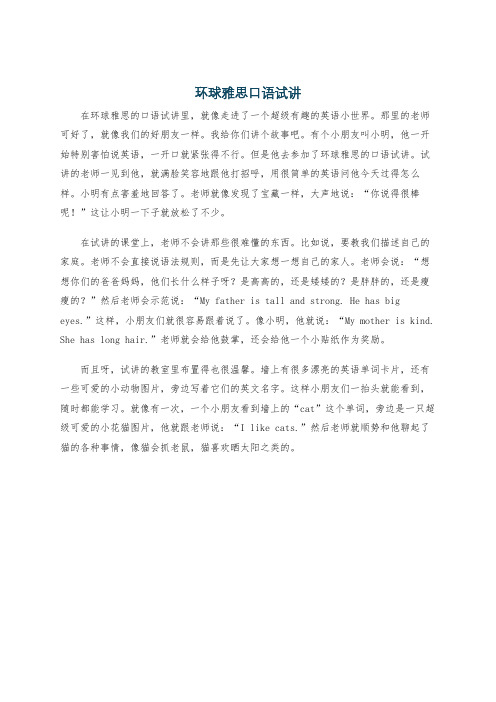
环球雅思口语试讲
在环球雅思的口语试讲里,就像走进了一个超级有趣的英语小世界。
那里的老师可好了,就像我们的好朋友一样。
我给你们讲个故事吧。
有个小朋友叫小明,他一开始特别害怕说英语,一开口就紧张得不行。
但是他去参加了环球雅思的口语试讲。
试讲的老师一见到他,就满脸笑容地跟他打招呼,用很简单的英语问他今天过得怎么样。
小明有点害羞地回答了。
老师就像发现了宝藏一样,大声地说:“你说得很棒呢!”这让小明一下子就放松了不少。
在试讲的课堂上,老师不会讲那些很难懂的东西。
比如说,要教我们描述自己的家庭。
老师不会直接说语法规则,而是先让大家想一想自己的家人。
老师会说:“想想你们的爸爸妈妈,他们长什么样子呀?是高高的,还是矮矮的?是胖胖的,还是瘦瘦的?”然后老师会示范说:“My father is tall and strong. He has big eyes.”这样,小朋友们就很容易跟着说了。
像小明,他就说:“My mother is kind. She has long hair.”老师就会给他鼓掌,还会给他一个小贴纸作为奖励。
而且呀,试讲的教室里布置得也很温馨。
墙上有很多漂亮的英语单词卡片,还有一些可爱的小动物图片,旁边写着它们的英文名字。
这样小朋友们一抬头就能看到,随时都能学习。
就像有一次,一个小朋友看到墙上的“cat”这个单词,旁边是一只超级可爱的小花猫图片,他就跟老师说:“I like cats.”然后老师就顺势和他聊起了猫的各种事情,像猫会抓老鼠,猫喜欢晒太阳之类的。
雅思口语1
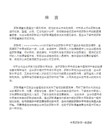
Which meal is your favorite meal, breakfast, lunch or dinner?
What’re your favorite colors?
How often do you write letters to your parents?
Do you often play games? (不要只想到computer games, 其实hide-and-seek, tag,I-spy-with-my-little-eye, math games, spelling bee都是美国孩子常玩的游戏)
you know,…
like…
coz…
…so…
Obviously…= n terms of culture, Paris is an amazing city.
kind of…
On the one hand,… On the other hand…
3 What are the differences between emails and letters?
参考答案:Hmm, let me see. It seems like there are many differences between them. To start with, email is very convenient. Also, it’s more fun than letters. Most importantly, emails are free. So I guess most people today prefer emails.
relaxing物←→annoying
relaxed人 ←→ nervous
环球雅思口语试讲
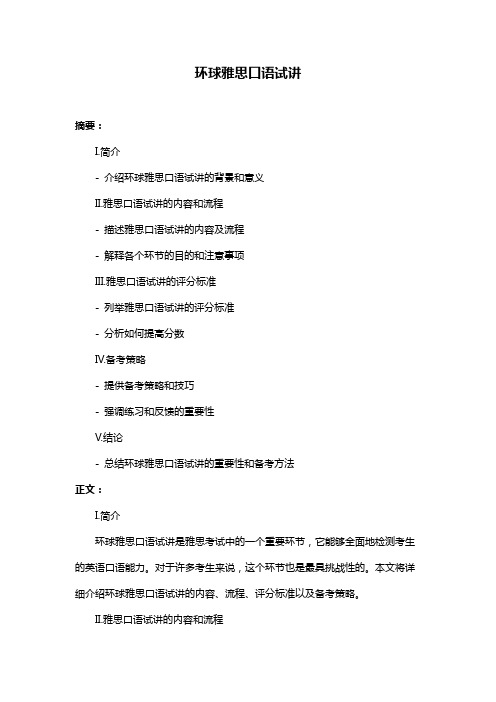
环球雅思口语试讲摘要:I.简介- 介绍环球雅思口语试讲的背景和意义II.雅思口语试讲的内容和流程- 描述雅思口语试讲的内容及流程- 解释各个环节的目的和注意事项III.雅思口语试讲的评分标准- 列举雅思口语试讲的评分标准- 分析如何提高分数IV.备考策略- 提供备考策略和技巧- 强调练习和反馈的重要性V.结论- 总结环球雅思口语试讲的重要性和备考方法正文:I.简介环球雅思口语试讲是雅思考试中的一个重要环节,它能够全面地检测考生的英语口语能力。
对于许多考生来说,这个环节也是最具挑战性的。
本文将详细介绍环球雅思口语试讲的内容、流程、评分标准以及备考策略。
II.雅思口语试讲的内容和流程雅思口语试讲通常分为三个部分:简介、主题陈述和问答环节。
在简介部分,考生需要用英语自我介绍,包括姓名、年龄、职业等基本信息。
在主题陈述部分,考生需要准备一个与雅思考试主题相关的话题,并进行2 到3 分钟的陈述。
在问答环节,考官会针对考生的陈述提出一些问题,考生需要回答这些问题。
III.雅思口语试讲的评分标准雅思口语试讲的评分标准主要包括:语法准确性、词汇丰富度、语言流畅性、发音和连贯性。
语法准确性指的是考生在使用英语时,能否正确地使用语法规则。
词汇丰富度指的是考生能否使用不同的词汇和表达方式来表达自己的想法。
语言流畅性指的是考生能否流利地使用英语进行表达。
发音指的是考生的发音是否准确、清晰。
连贯性指的是考生能否将不同的句子和段落有机地连接起来,形成一个完整的故事或观点。
IV.备考策略为了在雅思口语试讲中取得好成绩,考生需要进行充分的备考。
首先,考生需要了解雅思口语试讲的内容和流程,以便在考试时能够清楚知道下一步该做什么。
其次,考生需要练习自己的英语口语能力,包括语法准确性、词汇丰富度、语言流畅性和发音。
最后,考生需要不断地练习和获得反馈,以便了解自己的进步和改进方向。
V.结论总的来说,环球雅思口语试讲是一个非常重要的考试环节,它能够全面地检测考生的英语口语能力。
雅思口语课件完整课件

05 雅思口语考试备考建议
提高词汇量
总结词
丰富词汇量
详细描述
雅思口语考试要求考生具备足够的词 汇量来表达观点和描述事物。考生应 注重积累词汇,尤其是学科词汇和场 景词汇,可以通过阅读、听力、写作 等途径来扩充词汇量。
增强语言表达能力
总结词
提高口语流利度
详细描述
考生应注重提高自己的语言表达能力,包括 口语流利度和发音准确性。可以通过模仿母 语人士的发音和语调,参加口语培训班或找 语伴练习等方式来提高口语水平。
详细描述
我最难忘的经历是去国外旅行。这是我第一 次离开家乡,去探索不同的文化和风景。这 次旅行让我感受到了世界的广阔和多样性, 也让我更加了解了自己的文化背景。在旅行 中,我结交了很多新朋友,尝试了当地的美 食和风俗,也看到了很多令人惊叹的风景。
这次经历让我感到非常难忘和珍贵。
模拟试题三
要点一
总结词
考试内容
考试分为三个部分,第一部分是考官与考生进行交流,话题涉及个人背景、家庭 、兴趣爱好等;第二部分是考生就所给话题进行1分钟的准备,然后进行1分钟的 独白;第三部分是考官与考生就第二部分的话题进行深入讨论。
考试评分标准
01
02
03
04
流利度
评估考生在表达过程中是否流 畅,是否出现过多的停顿、重
熟悉考试题型和流程
总结词
了解考试要求和流程
详细描述
考生应熟悉雅思口语考试的题型和流程,包括了解考试 时间、评分标准、考试内容等。可以通过查看官方考试 指南或参加模拟考试来了解考试要求和流程,以便更好 地备考。
06 雅思口语考试真题及解析
真题一解析
总结词
描述一个你喜欢的地点
雅思口语讲义1

课程介绍Lecture 1: 雅思口语考试情况介绍考试内容和形式雅思口语评分标准口语的难点英语发音雅思口语考试长期准备战略三步走Lecture 2: 如何聊好Part 1Lecture 3—10: Part 2 and part 3 with various topics1. 雅思口语考试情况介绍1)考试时间:2)了解考官:3)程序:候考—点名—门口等候—入场—面谈4)入场5)客观性:详细的评分细则,考生可以对成绩进行复核主观性:礼貌、穿衣、眼神交流;发音不好,受汉语影响严重;考官要求6)中国雅思口语考试现状:倒数第一、倒数第二2. 考试内容和形式Three sectionsSection 1: introduction一般性交谈4-5分钟。
Section 2: individual long turn话题卡3-4分钟Section 3: two-way discussion双向讨论4-5分钟3. 评分标准•fluency and coherence 流利与连贯•Lexical resources 词汇量•Grammatical range and accuracy语法•pronunciation发音1. fluency and coherence 流利与连贯Band 5:usually maintains flow of speech but uses repetition, self-correction and/or slow speech to keep going.may overuse certain connectives and discourse markersproduce simple speech fluently, but more complex communication causes fluency problemsBand 6:is willing to speak at length, though may lose coherence at times due to occasional repetition, self-correction or hesitation.Uses a range of connectives and discourse markers but not always appropriateBand 7:speaks at length without noticeable effort or loss of coherence;may demonstrate language-related hesitationsuse a range of connectives and discourse markers with some flexibility2. Lexical resourcesBand 6Has a wide enough vocabulary to discuss topics at length and make meaning clear in spite of inappropriacies.Generally paraphrases successfullyBand 7Uses vocabulary resource flexibly to discuss a variety of topics;Uses some less common and idiomatic vocabulary and shows some awareness of style and collocation with some inappropriate choices.Uses paraphrase effectively3.Grammatical range and accuracyBand 6:Uses a mix of simple and complex structures, but with limited flexibility.May make frequent mistakes with complex structures, though these rarely cause comprehension problems.Band 7:use a range of complex structures with some flexibilityFrequently produces error-free sentences, though some grammatical mistakes persists 4. PronunciationBand 5: 能听懂,但需要仔细辨认Band 6can generally be understood throughout, though mispronunciation of individual words or sounds reduces clarity at times.Band 8Uses a wide range of pronunciation features;sustains flexible use of features, only with occasional lapses;is easy to understand throughout; L1 accent has minimal effect on intelligibility Band 7shows all the positive features of band 6 and some, but not all, the positive features of band 8.4. 口语的难点1)回答问题很被动2)表情、眼神3)地道的汉语式英语:犹豫;词尾是辅音时4)发音:咬舌音、卷舌音不管有没有r,都卷舌头5)语法:he/she不分5. 英语发音注意事项:1)发音位置靠后2)长元音和双元音饱满,单元音短促有力Mike likes to write by the nice bright light at night; Macao came back to China in 1999; I like the shape of the mountain.3)咬舌音there are thirty-three thousand three hundred and thirty-three feathers on the bird’s throat.4)易混淆的音[l], [r] well—wear; we’re terribly sorry for being late[l] 舌尖抬起,抵住齿龈根部,舌面凹,舌后部微抬,气流从舌边流出。
英语口语——雅思口语第3部分讲解.ppt

剑3---P29
DIFFERENT STYLES/METHODS OF TEACHING & LEARNING
• What method of learning works best for you? • How beneficial do you think it is to group students
• In another word, • That is to say, • Meaning,
• In this sense, • In the case,
Conversation repair
• It’s an interesting question… Let me see. Well, • Let me think for a second, • It’s difficult/hard to say … • I haven’t thought about it, but I guess… • This is difficult to answer, but maybe… • Well, I’m no expert, but I would say that… • Well, this is a good question!
exemplification(举例说明)
相关关联词 • For example, • For instance, • Take (Consider)…as an example • Such as … • Including …
explanation(解释说明)
相关关联词 • It means • That is to say, • In other words, • To put it another way, • By that I mean
雅思强化口语精讲班第4讲讲义2022
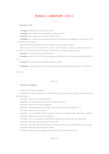
雅思强化口语精讲班第4讲讲义FilmExercise 6: FilmExaminer: What kind of films do you like?Candidate: I like foreign films, especially the Hollywood films.Examiner: Do you often go to cinemas to watch a film?Candidate: No, I rarely go to cinema because tickets are expensive nowadays. I borrow or buy VCD and watch the film at home.What’s the difference between watching films in the cinema and at home?Well, the sound effect is better in the cinema, and the screen is larger, but the audience can’t comment on the content freely. If we stay at home, we can talk about the plot any time.Examiner: What kind of films do you like best?Candidate: I like horror films. They are exciting and thrilling. I like the feeling of watching this kind of film.Examiner: Do you watch it by yourself or with your family?Candidate: It depends. But most of time I watch by myself because they don’t like it. They think it’s too scary.ShoppingExercise 6: ShoppingInterviewer: Do you like shopping?Candidate: Not really. I believe it is a waste of time, and I just go shopping when I need to buy some daily necessities.Interviewer: Who do you go shopping with?Candidate: I go shopping with my friends. I ask them for advice.Interviewer: How often do you go shopping?Candidate: I go shopping every two weeks. I take the bus to the supermarket nearby.Interviewer: What do you like to buy?Candidate: I buy sportswear, shoes or snacks like yogurt or sunflower seeds. They are my favorite.Interviewer: Where do you like to go shopping?Candidate: There is a supermarket called Peace Plaza near my home and I can walk there.Interviewer: Who does most shopping in your family?Candidate: My mother does most shopping, and she buys food, drinks, shampoo nearly every week.Interviewer: What department stores are there?Candidate: There is a large shopping mall. People can buy whatever they want.ReadingExercise 7: ReadingInterviewer: Do you like reading?Candidate: Well, yes. I like reading very much.Interviewer: Why do you like reading?Candidate: I like reading because I can get a lot of new information from books. I will know what life is like.Interviewer: What kind of books do you read?Candidate: I like novels because they are entertaining.Interviewer: And what’s your favorite book?Candidate: My favorite book is a love story. It’s called the Love of Duke.Interviewer: Where do you read books?Candidate: Most of time, I read at home. Sometimes I read in the municipal library.Interviewer: How do you get the books?Candidate: Sometimes I borrow books from libraries and sometimes I download from the Internet and I read on the computer.Interviewer: How many books can you read every day?Candidate: Well, I can read about two or three books everyday. If the book is thick, I can only read a few chapters.Interviewer: Do you like to discuss the contents with others when you read books?Candidate: Yes, I like sharing the essence of a book with my friends. We can discuss the opinions of th e author and see whether it’s the reality or not. I think that’s inspiring and instructive.TV programExercise 8: TV programInterviewer: Do you like watching TV?Candidate: Well, yes. I watch TV nearly every day.Interviewer: Why do you like watching TV?Candidate: You know, I’m busy with my work the whole day, and after I go home, I want to relax, and watching TV is a kind of relaxation.Interviewer: What’s your favorite program?Candidate: I like to watch news because I can know what is going on around me.Interviewer: Do other people in your family like watching TV?Candidate: No, they don’t like it because they think it’s a waste of time. For example, if you watch TV series, which has a strong appeal to the audience, you will want to know what’s going to happen next.。
雅思口语教案(LecturesofIELTS)
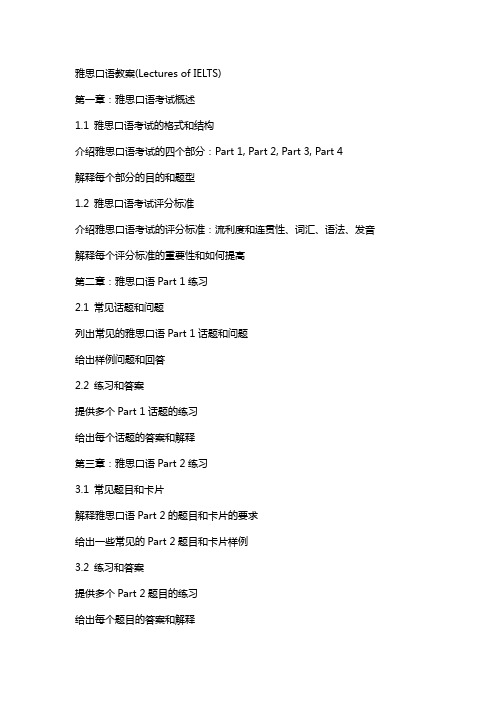
雅思口语教案(Lectures of IELTS)第一章:雅思口语考试概述1.1 雅思口语考试的格式和结构介绍雅思口语考试的四个部分:Part 1, Part 2, Part 3, Part 4解释每个部分的目的和题型1.2 雅思口语考试评分标准介绍雅思口语考试的评分标准:流利度和连贯性、词汇、语法、发音解释每个评分标准的重要性和如何提高第二章:雅思口语Part 1练习2.1 常见话题和问题列出常见的雅思口语Part 1话题和问题给出样例问题和回答2.2 练习和答案提供多个Part 1话题的练习给出每个话题的答案和解释第三章:雅思口语Part 2练习3.1 常见题目和卡片解释雅思口语Part 2的题目和卡片的要求给出一些常见的Part 2题目和卡片样例3.2 练习和答案提供多个Part 2题目的练习给出每个题目的答案和解释第四章:雅思口语Part 3练习4.1 题目和问题解释雅思口语Part 3的题目和问题给出一些常见的Part 3题目和问题样例4.2 练习和答案提供多个Part 3题目的练习给出每个题目的答案和解释第五章:雅思口语Part 4练习5.1 题目和问题解释雅思口语Part 4的题目和问题给出一些常见的Part 4题目和问题样例5.2 练习和答案提供多个Part 4题目的练习给出每个题目的答案和解释第六章:雅思口语Part 1深入分析与技巧提升6.1 针对不同类型的常见问题策略提供不同类型问题的回答策略,例如:个人信息、描述物体、谈论事件等给出实用的表达方式和过渡语6.2 提高流利度和连贯性的技巧介绍如何提高雅思口语的流利度和连贯性,例如:语音语调、节奏、断句等提供练习和实用技巧第七章:雅思口语Part 2深度练习与示范7.1 题目类型与示范详细介绍雅思口语Part 2的题目类型,如:人物、地点、物品、经历等提供各种题目的示范回答,并分析其优点和可借鉴之处7.2 个性化回答与展示技巧讲解如何为Part 2题目创造个性化回答介绍如何在回答中展示个人观点、情感和细节第八章:雅思口语Part 3应对策略与实战演练8.1 应对具体问题的策略提供针对雅思口语Part 3具体问题的应对策略分析问题类型,如:观点对比、原因分析、解决方案等,并提供回答模板8.2 实战演练与反馈设计多个Part 3题目进行实战演练提供反馈和建议,帮助学生提高应答能力第九章:雅思口语Part 4高效练习与解析9.1 题目类型与解析详细介绍雅思口语Part 4的题目类型,如:观点讨论、数据分析、趋势预测等分析题目要求,提供回答思路和表达方式9.2 高分答题技巧与练习讲解如何在Part 4中取得高分,如:使用丰富的词汇和语法结构、展示逻辑思维等提供多个Part 4题目的练习,并给出答案与解析第十章:雅思口语模拟测试与全面提升10.1 模拟测试与点评设计一套完整的雅思口语模拟测试,包括四个部分对学生的回答进行点评,提供改进意见和建议10.2 全面提升策略总结雅思口语考试的关键技巧和策略给出持续提高雅思口语水平的建议和资源推荐重点和难点解析1. 雅思口语考试概述难点解析:理解和掌握每个部分的评分标准,以及如何根据这些标准提高自己的口语能力。
雅思强化口语精讲班第1讲讲义
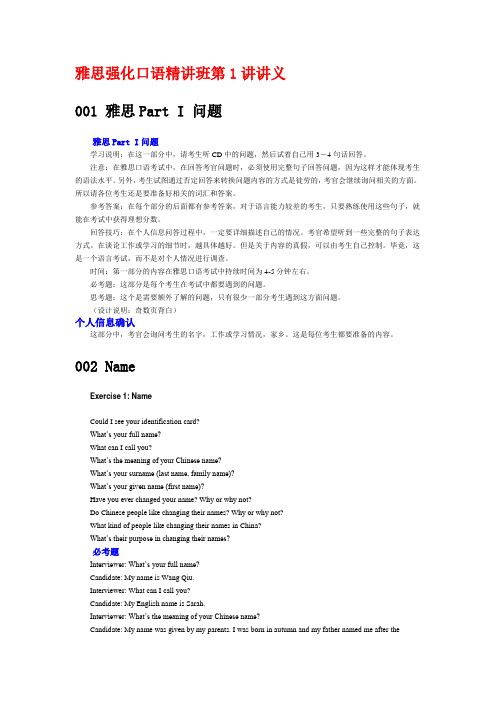
雅思强化口语精讲班第1讲讲义001 雅思Part I 问题雅思Part I问题学习说明:在这一部分中,请考生听CD中的问题,然后试着自己用3-4句话回答。
注意:在雅思口语考试中,在回答考官问题时,必须使用完整句子回答问题,因为这样才能体现考生的语法水平。
另外,考生试图通过否定回答来转换问题内容的方式是徒劳的,考官会继续询问相关的方面。
所以请各位考生还是要准备好相关的词汇和答案。
参考答案:在每个部分的后面都有参考答案,对于语言能力较差的考生,只要熟练使用这些句子,就能在考试中获得理想分数。
回答技巧:在个人信息问答过程中,一定要详细描述自己的情况。
考官希望听到一些完整的句子表达方式。
在谈论工作或学习的细节时,越具体越好。
但是关于内容的真假,可以由考生自己控制。
毕竟,这是一个语言考试,而不是对个人情况进行调查。
时间:第一部分的内容在雅思口语考试中持续时间为4-5分钟左右。
必考题:这部分是每个考生在考试中都要遇到的问题。
思考题:这个是需要额外了解的问题,只有很少一部分考生遇到这方面问题。
(设计说明:奇数页背白)个人信息确认这部分中,考官会询问考生的名字,工作或学习情况,家乡。
这是每位考生都要准备的内容。
002 NameExercise 1: NameCould I see your identification card?What’s your full name?What can I call you?What’s the meaning of your Chinese name?What’s your surname (last name, family name)?What’s your given name (first name)?Have you ever changed your name? Why or why not?Do Chinese people like changing their names? Why or why not?What kind of people like changing their names in China?What’s their purpose in changing their names?必考题Interviewer: What’s your full name?Candidate: My name is Wang Qiu.Interviewer: What can I call you?Candidate: My English name is Sarah.Interviewer: What’s the meaning of your Chinese name?Candidate: My name was given by my parents. I was born in autumn and my father named me after theseason.Interviewer: What’s your surname (last name, family name)?Candidate: Wang is my last name.Interviewer: What’s your given name (first name)?Candidate: Qiu is my first name.思考题Interviewer: Have you ever changed your name? Why or why not?Candidate: No, never. My name sounds ok, and there is no need for me to change it. Besides, it is too complicated to change a name in China. We have to go to the police station and change all our relevant documents.Interviewer: Do Chinese people like changing their names? Why or why not?Candidate: I guess not. According to us, our names are from our family tree or given by fortune-tellers. Our names can bring them good luck.Interviewer: What kind of people like changing their names in China? Why?Candidate: I guess some famous stars prefer to change their names because they believe that their new names are easy to be remembered.003 WorkingExercise 2: Working or Studying这部分中,工作的考生只需要准备工作的内容,上学的考生只准备关于学校的内容。
IELTS雅思口语试讲与测试课件
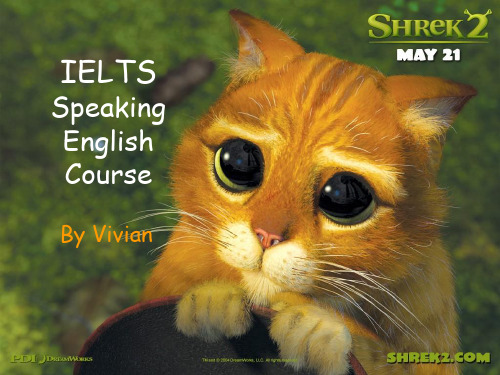
Little test
Group No.1
Please read these three groups of words aloud:
beach because yesterday famousight slow snow thick sick said sad Group No.2 newspaper industry temperature sandwich thought clothes kind comfortable quite quiet loose lose Group No.3 atomosphere celebrity affluent economic gorgeous unique resources sunbathing
Part 2 Practice
Choose a topic that you feel confident to talk about: Descripe a movie you have watched recently. Descripe a TV program you like. Descripe a person you like.
Speaking English Course
By Vivian
IELTS
Hi, I'm Vivian. Nice to meet u~
1. Self introduction 2. Your expectation in the speaking test 3. What do you think of your problem in speaking English?
Pharaphrase some words:
food human Lady GaGa television iphone Twilight travel Justin Bieber Flower
雅思口语考试内容介绍
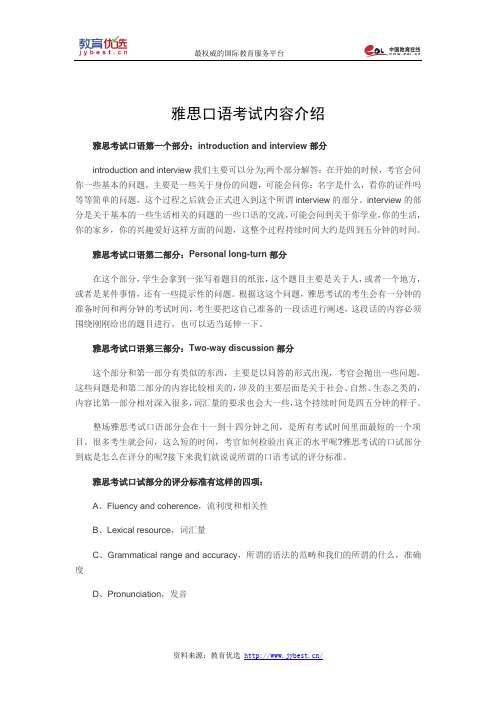
最权威的国际教育服务平台资料来源:教育优选 /雅思口语考试内容介绍雅思考试口语第一个部分:introduction and interview 部分introduction and interview 我们主要可以分为;两个部分解答:在开始的时候,考官会问你一些基本的问题,主要是一些关于身份的问题,可能会问你:名字是什么,看你的证件吗等等简单的问题,这个过程之后就会正式进入到这个所谓interview 的部分。
interview 的部分是关于基本的一些生活相关的问题的一些口语的交流,可能会问到关于你学业,你的生活,你的家乡,你的兴趣爱好这样方面的问题,这整个过程持续时间大约是四到五分钟的时间。
雅思考试口语第二部分:Personal long-turn 部分在这个部分,学生会拿到一张写着题目的纸张,这个题目主要是关于人,或者一个地方,或者是某件事情,还有一些提示性的问题。
根据这这个问题,雅思考试的考生会有一分钟的准备时间和两分钟的考试时间,考生要把这自己准备的一段话进行阐述,这段话的内容必须围绕刚刚给出的题目进行,也可以适当延伸一下。
雅思考试口语第三部分:Two-way discussion 部分这个部分和第一部分有类似的东西,主要是以问答的形式出现,考官会抛出一些问题,这些问题是和第二部分的内容比较相关的,涉及的主要层面是关于社会、自然、生态之类的,内容比第一部分相对深入很多,词汇量的要求也会大一些,这个持续时间是四五分钟的样子。
整场雅思考试口语部分会在十一到十四分钟之间,是所有考试时间里面最短的一个项目。
很多考生就会问,这么短的时间,考官如何检验出真正的水平呢?雅思考试的口试部分到底是怎么在评分的呢?接下来我们就说说所谓的口语考试的评分标准。
雅思考试口试部分的评分标准有这样的四项:A 、Fluency and coherence ,流利度和相关性B 、Lexical resource ,词汇量C 、Grammatical range and accuracy ,所谓的语法的范畴和我们的所谓的什么,准确度D 、Pronunciation ,发音。
雅思口语试讲

BONNIE
目 录
1 PART2 2 RUBRIC
3 STRUCTURE 4 CONTENT
01 PART - 2 Objects 抽象 具象
Objects
• Describe a uniform (in a school or company) you wear. • Describe something you bought but difficult to use at first. • Describe a gift that took you a lot of time to prepare. • Describe a popular product made in your hometown. • Describe a photo you like which is placed in your room. • Describe a toy you liked in your childhood. • Describe something useful you borrowed from others.
motto/awesome/fabulous • function -- retain heat, keep warm • style -- Scottish style, suit • color -- black with red stripes as
decoration
content
• what it is like • when you usually wear it • who bought it for you • and explain how you feel
about it
• I would like to describe ... which is ....
雅思口语详细介绍课件.doc
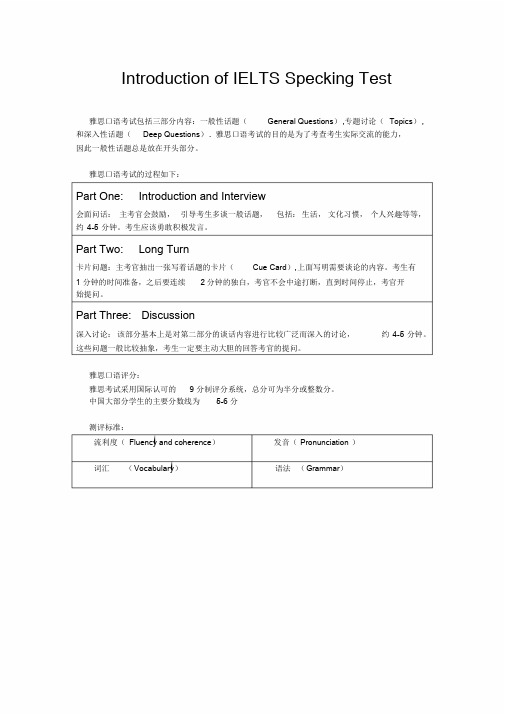
Introduction of IELTS Specking Test雅思口语考试包括三部分内容:一般性话题(General Questions),专题讨论(Topics), 和深入性话题(Deep Questions). 雅思口语考试的目的是为了考查考生实际交流的能力,因此一般性话题总是放在开头部分。
雅思口语考试的过程如下:Part One: Introduction and Interview会面问话:主考官会鼓励,引导考生多谈一般话题,包括:生活,文化习惯,个人兴趣等等,约4-5 分钟。
考生应该勇敢积极发言。
Part Two: Long Turn卡片问题:主考官抽出一张写着话题的卡片(Cue Card),上面写明需要谈论的内容。
考生有1 分钟的时间准备,之后要连续2 分钟的独白,考官不会中途打断,直到时间停止,考官开始提问。
Part Three: Discussion深入讨论:该部分基本上是对第二部分的谈话内容进行比较广泛而深入的讨论,约4-5 分钟。
这些问题一般比较抽象,考生一定要主动大胆的回答考官的提问。
雅思口语评分:雅思考试采用国际认可的9 分制评分系统,总分可为半分或整数分。
中国大部分学生的主要分数线为5-6 分测评标准:流利度(Fluency and coherence)发音(Pronunciation )词汇(Vocabulary)语法(Grammar)雅思口语评分三级跳“草根版”评准。
准,到底怎样到达?以下为分标评雅思口语的四项分标5 分6 分7 分Fluency 流利度句子中常常出现不必速比较自然,只出完整的句语能说有同学子,但是每隔几句一在很少的地方由于思要的停顿,还习惯用“er⋯”“a h⋯”了不必要定会有不连贯的地考答案出现出这f illers, 甚至中间较长的停顿方。
有可能出现时间的令人尴尬的停。
现长说时间没有话另外一个极端就是无顿,但是次数不多出来,完全敌流利喷没有喘气,睁眼,甚至中文都达不到的灵异境界,只能被考官为是在背书。
雅思口语讲义课件
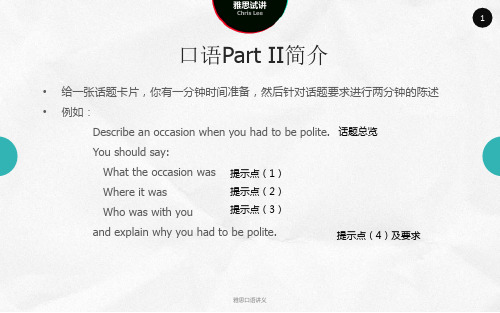
雅思试讲
Chris Lee
9
两分钟开始了!
• 带着你的关键词:Car(not moto/bicycle), Minicooper, Blue Medium Size, Fashionable, Attracting, Expensive, cannot buy now, convenience, show off, safety
• 套用背好的开头! • It has been my dream car since I saw the movie “The Italian Job” two year ago,
in which Mini Cooper is the biggest star. • 接着串关键词! • I would choose a car rather than a motor or bicycle because cars are perfect
雅思口语讲义
雅思试讲
Chris Lee
11
就快成功了!
• This feeling of independence, and the freedom to go where I please, is one of the reasons why I would like to own a Mini. More importantly, it’s a BMW, which earns its name by the safety performance. Together with its exquisite and classical looks, that’s why I would want a Mini Cooper.
• 两分钟结束
雅思口语讲义
雅思口语讲义
环球雅思口语试讲

环球雅思口语试讲环球雅思口语试讲Introduction:Hello everyone, my name is [Your Name] and I will be your speaker today for this Global IELTS Speaking Test. Today, I will be guiding you through the four sections of the IELTS Speaking Test, which are the Introduction, Individual Long Turn, Two-way Discussion, and the Conclusion. Let's start with the Introduction.Section 1: IntroductionIn this section, the examiner will ask you some questions about yourself, your interests, and your background. The purpose of this section is to assess your ability to provide personal information and speak about familiar topics.Examiner: Good morning/afternoon. Can you please introduce yourself and tell me a little bit about your background?Candidate: Good morning/afternoon. My name is [Your Name]. I am [age] years old, and I come from [city/country]. I recently graduated from [university/college] with a degree in [field of study]. I am currently working as a [job position] and I have been preparing for the IELTS test for a few months now.Examiner: That's great. Now, let's move on to some questions about your interests. Can you tell me about your favorite hobby? Candidate: Sure. One of my favorite hobbies is playing the guitar. I have been playing the guitar for about five years now. I find it agreat way to relax and express myself creatively. I enjoy playing different genres of music, from classical to rock. I believe that playing an instrument is not only a hobby, but also a form of self-expression.Examiner: That's interesting. So, do you play the guitar alone or do you perform in front of an audience?Candidate: I usually play the guitar alone in my free time, but I have also performed in front of small audiences. I have participated in a few talent shows and open mic nights at local cafes. It was a bit nerve-wracking at first, but it was a great experience to share my passion for music with others.Section 2: Individual Long TurnIn this section, you will be given a task card with a topic, and you will have one minute to prepare your response. After that, you will have to speak about the topic for one to two minutes. The purpose of this section is to assess your ability to speak fluently, coherently, and confidently on a given topic.Examiner: Now, I will give you a topic and you will have one minute to prepare your response. Here is your task card: Describe a memorable trip you have been on. You should say:- Where did you go?- Who did you go with?- What did you do during the trip?- Explain why it was memorable to you.Candidate: Thank you. Well, one of the most memorable trips I have been on was my visit to Japan last year. I went there with my family during the summer vacation. We visited several cities, but the highlight of the trip was our visit to Tokyo. We spent a week exploring the city and experiencing its vibrant culture.During our stay in Tokyo, we visited famous landmarks such as the Tokyo Tower and the Meiji Shrine. We also explored the bustling markets and tried various local foods, such as sushi and ramen. We took part in a traditional tea ceremony and even wore kimono for a day. The experience was truly immersive and gave us a deeper insight into the Japanese culture.What made this trip memorable to me was the unique blend of traditional and modern aspects of Japanese culture. It was fascinating to see how the city seamlessly combined ancient temples and shrines with futuristic technology and skyscrapers. The people were also incredibly welcoming and friendly, which made our stay even more enjoyable. Overall, the trip to Japan was a once-in-a-lifetime experience that I will cherish forever. Section 3: Two-way DiscussionIn this section, the examiner will engage in a discussion with you on a particular topic related to the theme of the previous section. The purpose of this section is to assess your ability to express and justify opinions, analyze information, and engage in a meaningful conversation.Examiner: Now, let's move on to the two-way discussion. We will continue talking about travel. What are the advantages anddisadvantages of traveling to foreign countries?Candidate: There are several advantages of traveling to foreign countries. Firstly, it allows us to experience different cultures and broaden our horizons. We can learn about the customs, traditions, and history of another country, which helps us develop a greater appreciation for diversity. Secondly, traveling to foreign countries enables us to gain new perspectives and challenge our preconceived notions. It opens our minds to different ways of thinking and helps us become more tolerant and understanding. On the other hand, there are also disadvantages to traveling abroad. One of the main disadvantages is the cost. Traveling to foreign countries can be quite expensive, especially when considering accommodation, transportation, and meals. Additionally, language barriers and cultural differences can pose challenges, especially for those who are not familiar with the local language or customs.Examiner: That's very true. Now, let's talk about sustainable tourism. What measures can be taken to promote sustainable tourism?Candidate: Sustainable tourism is becoming increasingly important in today's world. One of the key measures that can be taken to promote sustainable tourism is raising awareness among tourists and local communities. Educating tourists about the environmental and social impacts of their actions can help them make more sustainable choices. For example, encouraging them to use public transportation instead of private vehicles or to choose eco-friendly accommodations. Another measure is promoting responsible tourism practices, such as minimizing waste, conserving water andenergy, and supporting local businesses. Governments and tourism organizations can also implement regulations and policies to ensure sustainable tourism practices are followed. For instance, limiting the number of tourists in sensitive areas or implementing waste management policies. Overall, promoting sustainable tourism requires a collaborative effort from all stakeholders involved.Section 4: ConclusionIn this section, you will be given an opportunity to summarize and conclude the discussion. The purpose of this section is to assess your ability to summarize information, express a clear opinion, and make conclusions based on the previous sections.Examiner: Thank you for your insightful responses. Now, let's move on to the conclusion. Based on our discussion today, what are your thoughts on the importance of learning about different cultures?Candidate: Learning about different cultures is of utmost importance in today's interconnected world. It helps us foster a sense of global citizenship, understanding, and respect for others. By gaining knowledge about different cultures, we can break down stereotypes and build bridges of understanding. It also enables us to adapt and thrive in diverse environments, which is increasingly important in our multicultural societies. Learning about different cultures not only enriches our personal experiences but also cultivates a more inclusive and harmonious global community. Examiner: Thank you for your excellent response. That concludesour IELTS Speaking Test. Well done!Candidate: Thank you. It was a pleasure participating in this Global IELTS Speaking Test.。
雅思口试过程详解_1
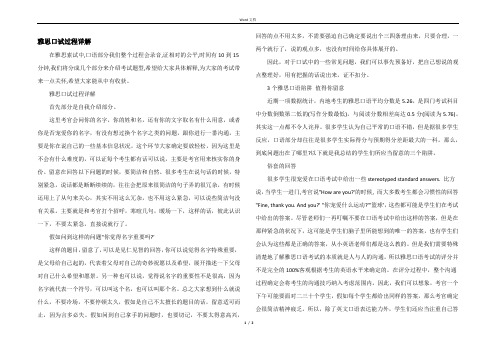
雅思口试过程详解在雅思索试中,口语部分我们整个过程会录音,证相对的公平,时间有10到15分钟,我们将分成几个部分来介绍考试题型,希望给大家具体解释,为大家的考试带来一点关怀,希望大家能从中有收获。
雅思口试过程详解首先部分是自我介绍部分。
这里考官会问你的名字,你的姓和名,还有你的文字取名有什么用意,或者你是否宠爱你的名字,有没有想过换个名字之类的问题,跟你进行一番沟通,主要是你在说自己的一些基本信息状况,这个环节大家确定要放轻松,因为这里是不会有什么难度的,可以证每个考生都有话可以说,主要是考官用来核实你的身份。
留意在回答以下问题的时候,要简洁和自然。
很多考生在说句话的时候,特别紧急,说话都是断断续续的,往往会把原来很简洁的句子弄的很冗杂,有时候还用上了从句来关心,其实不用这么冗杂,也不用这么紧急,可以说些简洁句没有关系。
主要就是和考官打个招呼,寒暄几句,暖场一下,这样的话,彼此认识一下,不要太紧急,直接说就行了。
假如问到这样的问题"你觉得名字重要吗?'这样的题目,留意了,可以是见仁见智的回答,你可以说觉得名字特殊重要,是父母给自己起的,代表着父母对自己的奇妙祝愿以及希望,展开描述一下父母对自己什么希望和愿景。
另一种也可以说,觉得说名字的重要性不是很高,因为名字就代表一个符号,可以叫这个名,也可以叫那个名。
总之大家想到什么就说什么,不要冷场,不要停顿太久,假如是自己不太擅长的题目的话,留意适可而止,因为言多必失。
假如问到自己拿手的问题时,也要切记,不要太得意高兴,回答的点不用太多,不需要强迫自己确定要说出个三四条理由来,只要合理,一两个就行了,说的观点多,也没有时间给你具体展开的。
因此,对于口试中的一些常见问题,我们可以事先预备好,把自己想说的观点整理好,用有把握的话说出来,证不扣分。
3个雅思口语陷阱值得你留意近期一项数据统计,内地考生的雅思口语平均分数是5.26,是四门考试科目中分数倒数第二低的(写作分数最低),与阅读分数相差高达0.5分(阅读为5.76)。
- 1、下载文档前请自行甄别文档内容的完整性,平台不提供额外的编辑、内容补充、找答案等附加服务。
- 2、"仅部分预览"的文档,不可在线预览部分如存在完整性等问题,可反馈申请退款(可完整预览的文档不适用该条件!)。
- 3、如文档侵犯您的权益,请联系客服反馈,我们会尽快为您处理(人工客服工作时间:9:00-18:30)。
Example: What kind of apps do you often use?
• Personally, I’m a big fan of using WeChat application, which is one of the most popular social applications around the China. • Cuz using WeChat to communicate with others is extremely convenient and timesaving. • WeChat can provide users with video call and voice call so people can communicate face-to-face whenever we want, even with long-distance friends and relatives. For example, when I live in America, WeChat is an important platform where I can share my daily life with all my friends.
答题方法
• Topic statement (point):直接回答考官的问题
Yes\NO As far as I am concerned, Personally, I consider From my point of view, From my perspective,
• Reasons:给出1-2个原因去支持自己的point
Because=Since=AS ( coz) The reason is Due to In order to Thus/ therefore/ hence/ as a result
• Use details and examples to explain your answer
列举(for example; for instance; such as ; like) 个人经历 感受: When I feel upset\stressful… 对比: Compared with some individual sports like jogging, I can encounter more new friends through playing basketball…
HOW TO ANSWER?
• What’s your favorite season? • I like winter best. I enjoy the snow in winter. It is so beautiful. (5分)
• It’s spring because everything is fresh in spring. Sometimes we have light rain. Spring is gentle and comfortable. (6分)
FACE TO FACE COMMUNICATION
• •
Smile and polite Eye contact
•
Confident
PART 1
• Personal information:
• hometowns, jobs or studies;
• Daily life
• Shopping, food/drink, weather,art, music, hand writing…
TIPS
• 六字诀: time; cost; mood; health; safety; knowledge
• Coin 法: advantages & disadvantages
• 总分法: 分情况讨论,而不是只专注在一个角度 • 积累常用观点:Make friends,Improve xxx skills,Keep fit and healthy,A Sense of …
IELTS SPEAKING
考试概述
• Three parts:
• Part 1
• self introduction & daily ques 2
• cue card---description
• Part 3
• more about part 2---discussion
NOTICE
• 不可求简,发散思维;尽情发挥---more details 最好不要说谎;不要停顿太久 • 平均每个问题3-4句话;每个问题回答时间在20-30秒左右
PART 1 备考
• 1、多练习,多张口说 • 2、练习跟读,素材可以使用雅思听力、英剧、美剧、TED等 • 3、积累场景词汇:购物类、爱好类、地点类。。。 • 4、在练习时可录音,自己听
